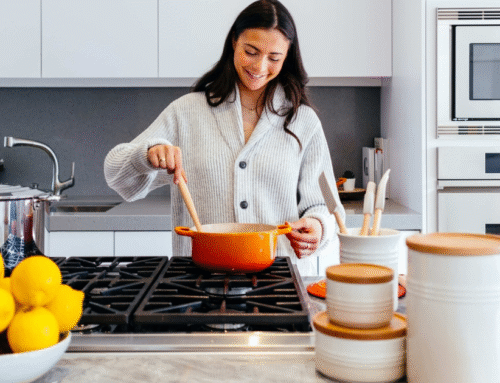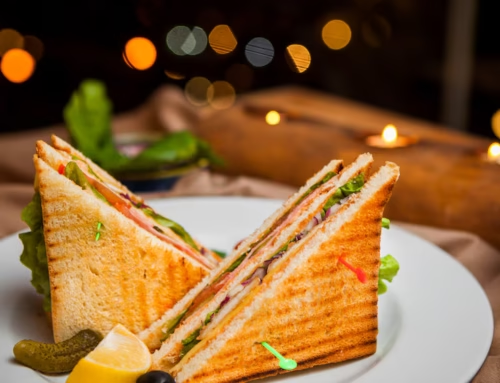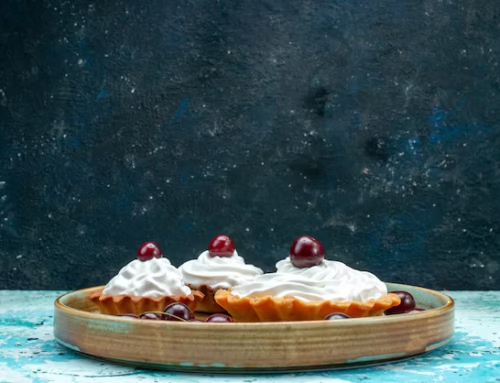Some vegetables can mess with your sleep and digestion if eaten too close to bedtime. Broccoli can make you gassy, and tomatoes can upset your stomach. It’s best to eat these veggies earlier in the day.
Knowing how different veggies affect your sleep and digestion can help you choose better for dinner. This way, you can get a good night’s rest and stay healthy.
Key Takeaways :Vegetables To Avoid Eating At Night
- Cruciferous veggies like broccoli and cauliflower can cause digestive issues and disrupt sleep due to their high fiber content and slow digestion.
- Tomatoes and their acidic nature may contribute to acid reflux, interfering with the ability to fall and stay asleep.
- Cucumbers’ high water content can lead to frequent bathroom trips, disrupting nighttime rest.
- Onions contain fructans that can cause gas and bloating, especially for those prone to digestive problems.
- Spicy peppers can irritate the throat and trigger acid reflux, hindering sleep quality.
Understanding Why Some Vegetables Affect Night Sleep
Our nighttime sleep quality can be influenced by the foods we eat, including certain vegetables. The science behind this shows some interesting facts.
The Science Behind Nighttime Digestion
Vegetables like broccoli and cauliflower are dense and hard to digest. They are full of fiber and complex carbs. This can cause digestive problems if we eat them before bed.
How Vegetables Impact Sleep Quality
Tomatoes, for example, have an amino acid called tyramine. It can make it harder to fall asleep. Also, veggies with a lot of vitamin C can mess with digestion at night, leading to sleep issues.
The Role of Fiber and Complex Carbohydrates
Fiber and complex carbs are good for us, but not before bed. They take time to digest. This keeps our body active, making it hard to get deep sleep.
Knowing how different veggies affect our sleep is key. It helps us choose better foods for our evening meals and snacks.
| Vegetable | Effect on Sleep |
|---|---|
| Broccoli | High in fiber and complex carbohydrates, can disrupt digestion and sleep |
| Tomatoes | Contain tyramine, an amino acid that can stimulate brain activity and make it harder to fall asleep |
| Cucumbers | High water content can lead to increased bathroom trips during the night, disrupting sleep |
Cruciferous Vegetables: Broccoli and Cauliflower

Broccoli and cauliflower are top cruciferous vegetables for your diet. They’re full of vitamins, minerals, and antioxidants. But, they might not be the best for nighttime eating.
These veggies have a sugar called raffinose. It’s hard for your body to digest, especially at night. Eating them close to bed can cause gas, bloating, and discomfort.
Cauliflower also has sulforaphane, which can upset your stomach at night. Plus, their high fiber makes them too filling for before bed.
It’s better to eat broccoli and cauliflower earlier in the day. This way, your body can digest them well. Try to include them in your meals and snacks during the day, not before bed.
“Studies suggest that a diet rich in cruciferous vegetables may lower the rates of various cancers such as breast, pancreatic, bladder, lung, prostate, and colon cancer.”
Being mindful of when you eat these cruciferous vegetables helps. You’ll get their nutritional benefits without digestive issues at night.
Vegetables To Avoid Eating At Night

What we eat before bed can affect our sleep. Some vegetables, though healthy, can mess with our sleep if eaten too late. Let’s look at three vegetables to avoid in the evening.
Tomatoes and Acid Reflux Concerns
Tomatoes are good for you but can be bad for sleep. They’re acidic and have tyramine, which can make your brain active. This can lead to acid reflux and heartburn, making it hard to sleep.
Cucumbers and Water Retention
Cucumbers are mostly water, which can cause you to pee a lot at night. This water retention can mess with your sleep, making you tired in the morning.
Onions and Digestive Discomfort
Onions have fructan carbs that some people can’t digest well. This can cause digestive discomfort like gas and pain. Eating onions before bed can make it hard to sleep well.
How you react to these nighttime vegetables can differ. If they mess with your sleep, eat them earlier in the day. This way, your body can digest them better.
Being careful with your vegetable choices and when you eat them can improve your sleep. Try eating sleep-friendly foods like cherries, bananas, and almonds for a better night’s rest.
Better Timing for Vegetable Consumption
To avoid digestive issues and sleep disruption, eat dense vegetables early in the day. This gives your body enough time to digest them before night. For dinner, choose lighter veggies like leafy greens or cooked ones. They are easier to digest and won’t cause bloating or discomfort.
Optimal Hours for Eating Dense Vegetables
Registered dietitian Alexis Supan says eat dense veggies early, like when you wake up or at lunch. This fits with your body’s natural rhythm. It helps you digest better before sleep, improving your sleep quality.
Digestive Window Recommendations
Experts say stop eating dense veggies three hours before bed. This gives your body time to digest. It prevents sleep disruptions. People with digestive issues might need to adjust this time based on their body’s needs.
Alternative Vegetable Choices for Evening Meals
For dinner, pick lighter veggies that are easy on your stomach. Leafy greens and cooked veggies like zucchini or bell peppers are good. They’re less likely to upset your digestion and help you sleep better.
Also Read : Eating With The Seasons: A Guide To Fresh And Flavorful Seasonal Foods
FAQs
Q: What are some of the worst foods to eat at night?
A: Some of the worst foods to eat at night include spicy foods, high-fat fried foods, and sugary snacks. These can disrupt your sleep cycle and make it difficult to achieve restful sleep.
Q: Why should I avoid caffeine before bed?
A: Caffeine is a stimulant that can significantly impact your ability to fall asleep and stay asleep. It’s best to avoid caffeine for at least 6 hours before bedtime to ensure better sleep quality.
Q: What are some best foods for sleep that I can eat at night?
A: Some of the best foods for sleep include foods rich in tryptophan, like turkey and bananas, as well as foods high in magnesium, such as leafy greens and nuts. These foods promote relaxation and can enhance the quality of your sleep.
Q: Are there any specific foods to avoid before bedtime?
A: Yes, you should avoid foods that can cause indigestion or heartburn, such as spicy foods and citrus fruits like oranges and grapefruits. These can disrupt your sleep and make you feel uncomfortable during the night.
Q: How do high-protein foods affect sleep?
A: While high-protein foods are beneficial for many reasons, consuming them right before bed might make you feel too energized. It’s best to choose lighter options or foods to eat before bed that are easier to digest.
Q: What types of snacks are considered best foods to eat before bed?
A: Snacks such as a small serving of cherries, a banana, or a handful of nuts are considered some of the best foods to eat before bed. They are not only nutritious but also promote deeper and more restorative sleep.
Q: Can eating late at night affect my sleep quality?
A: Yes, eating late at night can disrupt your sleep cycle, especially if you consume heavy or spicy foods. It’s advisable to eat at least 2-3 hours before bedtime to allow your body to digest properly.
Q: What should I consider when choosing foods to eat before bed?
A: When choosing foods to eat before bed, aim for those that are low in sugar and fat, and high in nutrients that support sleep, such as magnesium and tryptophan. This will help improve your overall sleep quality.
Q: Are there any foods that can help with sleep apnea?
A: While no specific foods can cure sleep apnea, avoiding heavy meals, alcohol, and caffeine before bed can help manage symptoms. Incorporating foods rich in omega-3 fatty acids and antioxidants may contribute to better sleep health.
Source Links
- https://sgwetmarket.com.sg/blogs/articles/health-tips-do-not-eat-these-vegetables-at-night
- https://www.ndtv.com/health/avoid-these-vegetables-for-dinner-to-prevent-bloating-at-night-3964695
- https://www.saatva.com/blog/10-foods-avoid-before-bed/
- https://www.sleephealthsolutionsohio.com/blog/foods-avoid-before-sleep/
- https://www.resmed.com/en-us/sleep-apnea/sleep-blog/foods-to-avoid-at-night/
- https://health.clevelandclinic.org/crunchy-and-cruciferous-youll-love-this-special-family-of-veggies
- https://www.everydayhealth.com/diet-nutrition-pictures/health-reasons-not-to-eat-your-vegetables.aspx
- https://urology.ucsf.edu/sites/urology.ucsf.edu/files/uploaded-files/basic-page/food-guides-for-prostate-health-web-2024.pdf
- https://comprehensivesleepcare.com/2023/10/18/top-ten-foods-to-avoid-for-a-good-nights-sleep/
- https://www.medicinenet.com/8_foods_you_should_avoid_that_will_keep_you_awake/article.htm
- https://www.benenden.co.uk/be-healthy/nutrition/the-best-and-worst-foods-for-sleep/
- https://health.clevelandclinic.org/is-eating-before-bed-bad-for-you
- https://wellbeing.jhu.edu/blog/2022/12/09/timing-is-everything-why-eating-on-a-regular-schedule-supports-overall-well-being/








Leave A Comment